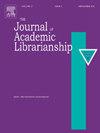Assessing the geography of the chat reference service in a post-pandemic university community
IF 2.3
3区 管理学
Q2 INFORMATION SCIENCE & LIBRARY SCIENCE
引用次数: 0
Abstract
The project assessed the geographic distribution of the chat reference questions in the years following the easing of COVID-19 social distancing. The purpose of this assessment is to determine the geographic footprint of the chat reference service and the suitability of the chat reference operational hours compared to the geographic origin of chat reference questions. In fall 2020, overnight chat reference hours were added to accommodate the sudden increase in distance learning students whose geographic locations meant the chat reference service would be closed during their local daytime working hours. Individual chat reference transactions from 2019, 2021, 2022, and 2023 were geolocated and analyzed using ArcGIS Online to establish the time and spatial distribution of the chat reference questions. This study found that the overnight chat reference hours added in 2020 were used predominantly by the local community as of fall 2023, though international locations were still represented in the data set. Further, it was found that the geographic distribution of chat reference questions as of fall 2023 had returned to a level similar to pre-pandemic levels, though there were significant differences within the local level. This suggests that chat reference usage has entered a new usage paradigm following the rapid pandemic-induced changes in 2020 and 2021.
评估大流行后大学社区聊天参考服务的地理位置
该项目评估了在COVID-19社交距离放松后的几年中聊天参考问题的地理分布。此评估的目的是确定聊天参考服务的地理足迹,以及与聊天参考问题的地理来源相比,聊天参考运营时间的适用性。2020年秋季,增加了夜间聊天参考时间,以适应远程学习学生的突然增加,这些学生的地理位置意味着聊天参考服务将在当地白天工作时间关闭。利用ArcGIS Online对2019年、2021年、2022年和2023年的个人聊天参考交易进行地理定位和分析,建立聊天参考问题的时空分布。该研究发现,截至2023年秋季,2020年增加的夜间聊天参考时间主要由当地社区使用,尽管数据集中仍有国际地点的代表。此外,调查发现,截至2023年秋季,聊天参考问题的地理分布已恢复到类似于大流行前的水平,尽管在地方一级存在重大差异。这表明,在2020年和2021年大流行引发的快速变化之后,聊天参考的使用进入了一个新的使用范式。
本文章由计算机程序翻译,如有差异,请以英文原文为准。
求助全文
约1分钟内获得全文
求助全文
来源期刊

Journal of Academic Librarianship
INFORMATION SCIENCE & LIBRARY SCIENCE-
CiteScore
5.30
自引率
15.40%
发文量
120
审稿时长
29 days
期刊介绍:
The Journal of Academic Librarianship, an international and refereed journal, publishes articles that focus on problems and issues germane to college and university libraries. JAL provides a forum for authors to present research findings and, where applicable, their practical applications and significance; analyze policies, practices, issues, and trends; speculate about the future of academic librarianship; present analytical bibliographic essays and philosophical treatises. JAL also brings to the attention of its readers information about hundreds of new and recently published books in library and information science, management, scholarly communication, and higher education. JAL, in addition, covers management and discipline-based software and information policy developments.
 求助内容:
求助内容: 应助结果提醒方式:
应助结果提醒方式:


